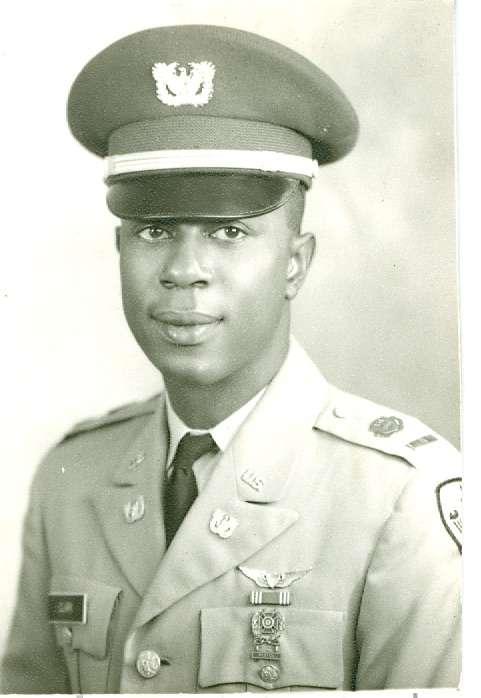Biography
Jerry Prosper Clark grew up in Davenport, Iowa and was the second youngest of the four children in the Clark family. At Davenport High School, he pursued many interests – he was in the art club, ran track and served on student council.
A classmate said, “Jerry and I were both on the track team, although as I recall neither of us was exceptional - we just enjoyed having an opportunity to be on the team. Jerry was of medium height and build with a ready smile. He was very sociable and made friends easily. He was the kind of kid that everyone liked.”
Jerry graduated from high school in 1958 and was one of seven students at Davenport High to receive the American Citizenship Award from the Iowa State Bar Association for his understanding of the constitutional form of government.
About this time – in 1958 -- Jerry and his younger brother Jim were part of a 5-man singing group called The Darts. They signed with the Tempus recording company in September, and cut a record in November that got a quite a bit of airplay. It was a lot of fun for the group but the whimsical nature of the entertainment business ended up favoring another Tempus group, Little Anthony and the Imperials, and the Darts’ moment of fame faded away.
After high school, Jerry attended the University of Dubuque for a year studying Chemical Engineering before transferring to Iowa State, where he attended classes from Fall 1960 to Spring 1961.
Jerry’s older brother, ReVerl, had served in the military and Jerry started thinking about the service. He had an ambition to fly, so he left Iowa State and went home to Davenport to make plans and work. He got a job at the Rock Island Arsenal as a supply clerk.
In 1963, he was among the first Iowans to qualify for the US Army Warrant Officer flight training program. He married his high school sweetheart that summer and headed for basic training at Ft. Leonard Wood in September. In December, he moved on to advanced flight training at Camp Wolters, TX and Ft. Rucker, AL. He graduated in October 1964 as a fixed wing pilot and ranked second in his class of 73 men.
He was remembered by a “stick buddy” as “…a very special guy. He did what he had to do and helped you if he could. In the early 1960s, it was rare for a black individual to start flight school let alone graduate. We started with 175 people and 73 finished. You had to have a love for flying, excitement, and be half crazy. The only requirement was a high school diploma and passing a flight physical which was not easy. Pre flight – the first 4 weeks -- was the toughest. The physical and mental requirements were very hard. The officers did their best to make you quit. The South was still pretty segregated at the time we were in flight school, so there were times when he couldn’t get into places. We went to the movies and had to sit in the balcony with him, which was okay because he was our friend.” Jerry truly loved flying. It’s likely he would have found his career in the military.
He shipped to Vietnam with the 568th Signal Company in September1965.
On December 15 Jerry was conducting a reconnaissance mission over jungle covered mountains south of the major port city of Qui Nhon, Khanh Hoa Province, South Vietnam. During the flight he experienced an in-flight emergency and radioed the airfield stating his engine battery had exploded and he was low on fuel but thought he could make it home.
A nearby helicopter heard the emergency call and tried to provide him with whatever assistance he needed. Shortly thereafter, the plane’s engine quit and Jerry headed for the beach. Aircraft and vessels dispatched to the site had no trouble locating the plane but could find no sign of Jerry. It was thought that he had been taken prisoner by the North Vietnamese. Stories from residents of nearby villages differed and could not be substantiated.
Clark was declared Missing in Action on December 15, 1965. His status was changed to missing/presumed dead in 1973.
He was 25 years old.
Footnote: After Jerry arrived in Vietnam, he and others in his company started spending their off-duty hours with children at the nearby Holy Infants Orphanage.
Jerry sent a letter to the Davenport Jaycees describing the children’s difficulties and asking if the Jaycees would provide clothing, shoes and toys for 115 children. The Jaycees were thrilled to fulfill the request, naming the drive the “Road Runner Orphanage Drive” after the 568th company mascot. Jerry’s unit also planned to build a new kitchen for the orphanage and organize a Christmas dinner complete with turkey.
Due to Jerry’s hometown connection and the Jaycee’s “Airmail Santa”, the children must have had a wonderful Christmas. A friend of the Clark family stated that Jerry must have learned that kind of generosity from his parents, who were always ready to lend a helping hand to those who need it.
Jerry is remembered with a marker at the Rock Island National Cemetery.
